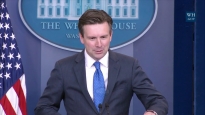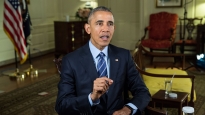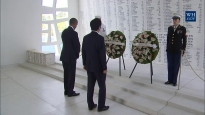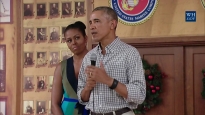President Obama Provides an Update on the Ebola Outbreak
October 06, 2014 | 9:33 | Public Domain
On October 6, 2014, President Obama was briefed on the Ebola outbreak in the U.S. and abroad, and provided an update on the U.S. preparedness and response to the epidemic.
Remarks by the President After Meeting on Ebola
Roosevelt Room
4:04 P.M. EDT
THE PRESIDENT: Good afternoon, everybody. I just had an opportunity to get a full briefing from my entire team across administrations -- across agencies on the aggressive steps that we are taking to fight the Ebola epidemic, to stop the epidemic at its source in West Africa but also to make sure that we are doing everything we need to do to prevent an outbreak here in the United States.
As I’ve said from the start of this outbreak, I consider this a top national security priority. This is not just a matter of charity -- although obviously the humanitarian toll in countries that are affected in West Africa is extraordinarily significant. This is an issue about our safety. It is also an issue with respect to the political stability and the economic stability in this region.
And so it is very important for us to make sure that we are treating this the same way that we would treat any other significant national security threat. And that’s why we’ve got an all-hands-on-deck approach -- from DOD to public health to our development assistance, our science teams -- everybody is putting in time and effort to make sure that we are addressing this as aggressively as possible.
I know that the American people are concerned about the possibility of an Ebola outbreak, and Ebola is a very serious disease. And the ability of people who are infected who could carry that across borders is something that we have to take extremely seriously. At the same time, it is important for Americans to know the facts, and that is that because of the measures that we’ve put in place, as well as our world-class health system and the nature of the Ebola virus itself -- which is difficult to transmit -- the chances of an Ebola outbreak in the United States is extremely low.
Procedures are now in place to rapidly evaluate anybody who might be showing symptoms. We saw that with the response of the airplane in Newark and how several hospitals across the United States have been testing for possible cases. In recent months we’ve had thousands of travelers arriving here from West Africa, and so far only one case of Ebola has been diagnosed in the United States, and that’s the patient in Dallas. Our prayers are obviously with him and his family.
We have learned some lessons, though, in terms of what happened in Dallas. We don’t have a lot of margin for error. The procedures and protocols that are put in place must be followed. One of the things that we discussed today was how we could make sure that we’re spreading the word across hospitals, clinics, any place where a patient might first come in contact with a medical worker to make sure that they know what to look out for, and they’re putting in place the protocols and following those protocols strictly. And so we’re going to be reaching out not only to governors and mayors and public health officials in states all across the country, but we want to continue to figure out how we can get the word out everywhere so that everybody understands exactly what is needed to be done.
Meanwhile, at the federal level, we’re constantly reviewing and evaluating the measures that we already have in place to see if there are additional improvements. We continue to look at any additional steps that can be taken to make sure that the American people are safe, which is our highest priority.
And finally, we had a discussion about what we’re doing on site in West Africa. There’s been already extraordinary work done by the Department of Defense in conjunction with the CDC in standing up isolation units and hospital beds. We are making progress. The environment is difficult because the public health system there has very few resources and is already extraordinarily fragile.
And I’ll be very honest with you -- although we have seen great interest on the part of the international community, we have not seen other countries step up as aggressively as they need to. And I said at the United Nations, and I will repeat, that this is an area where everybody has to chip in and everybody has to move quickly in order for us to get this under control. Countries that think that they can sit on the sidelines and just let the United States do it, that will result in a less effective response, a less speedy response, and that means that people die, and it also means that the potential spread of the disease beyond these areas in West Africa becomes more imminent.
So I’m going to be putting a lot of pressure on my fellow heads of state and government around the world to make sure that they are doing everything that they can to join us in this effort. We’ve got some small countries that are punching above their weight on this, but we’ve got some large countries that aren’t doing enough. And we want to make sure that they understand that this is not a disease that’s going to discriminate, and this is something that all of us have to be involved in.
So the bottom line is, is that we’re doing everything that we can to make sure, number one, that the American people are safe; I’m confident that we’re going to be able to do that. But we’re also going to need to make sure that we stop this epidemic at its source. And we’re profoundly grateful to all our personnel -- our medical personnel, our development personnel, our military personnel who are serving in this effort. It’s because of their professionalism, their dedication and their skill that we are going to be able to get this under control, but this is a faraway place, with roads that in many cases are impassable, areas that don’t have even one hospital. We’re having to stand up, essentially, a public health infrastructure in many of these areas that haven't had it before, and that requires an enormous amount of effort.
I’m very grateful for the people who are on the front lines making this work. It’s a reminder once again of American leadership. But even with all the dedicated effort that our American personnel are putting in, there are going to be -- they need to be joined by professionals from other countries who are putting up similar effort and similar resources. And so I hope they’re going to be paying attention over the next several weeks so we can get on top of this.
Thank you.
Q What do you say to the American people who remain nervous in spite of your assurances?
THE PRESIDENT: Well, I just explained to them that the nature of this disease -- the good news is, is that it’s not an airborne disease. We are familiar with the protocols that are needed to isolate and greatly reduce the risks of anybody catching this disease, but it requires us to follow those protocols strictly, and that’s exactly what we are in the process of doing. And the CDC is familiar with dealing with infectious diseases and viruses like this. We know what has to be done and we’ve got the medical infrastructure to do it. But this is an extraordinarily virulent disease when you don’t follow the protocols.
And so the key here is just to make sure that each step along the way -- whether it’s a hospital admissions desk, whether it is the doctors, the nurses, public health officials -- that everybody has the right information. If they have the right information and they’re following those protocols, then this is something that we’re going to be able to make sure does not have the kind of impact here in the United States that a lot of people are worried about. But that requires everybody to make sure that they stay informed. Most particularly, we’ve got to make sure that our health workers are informed.
We’re also going to be working on protocols to do additional passenger screening, both at the source and here in the United States. All of these things make me confident that here in the United States, at least, the chances of an outbreak, of an epidemic here are extraordinarily low.
But let’s keep in mind that, as we speak, there are children on the streets dying of this disease -- thousands of them. And so obviously my first job is to make sure that we’re taking care of the American people, but we have a larger role than that. We also have an obligation to make sure that those children and their families are safe as well, because ultimately the best thing we can do for our public health is also to extend the kind of empathy, compassion and effort so that folks in those countries as well can be rid of this disease.
Thank you very much, everybody.
Q Are you looking to the private sector --
THE PRESIDENT: A lot of volunteering. Thank you, everybody.
END
4:15 P.M. EDT
|
January 3, 2017
|
December 31, 2016
|
December 27, 2016
|
December 27, 2016
|
|
December 26, 2016
|
December 24, 2016
|
December 21, 2016
|
December 17, 2016
|
- &lsaquo previous
- 1
- 2
- 3
- 4
- 5
- 6
- 7
- 8
- 9
- …
- next &rsaquo







